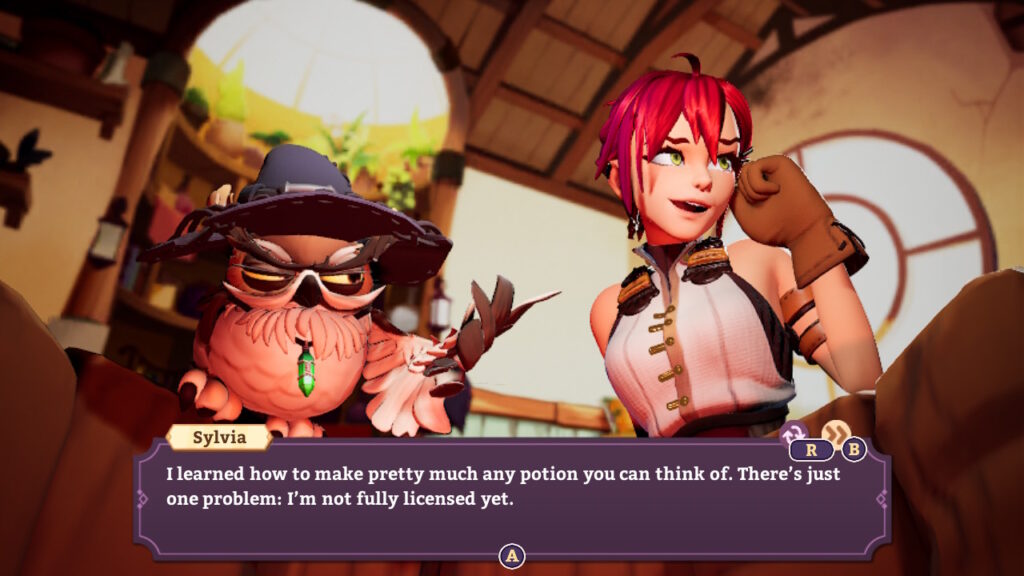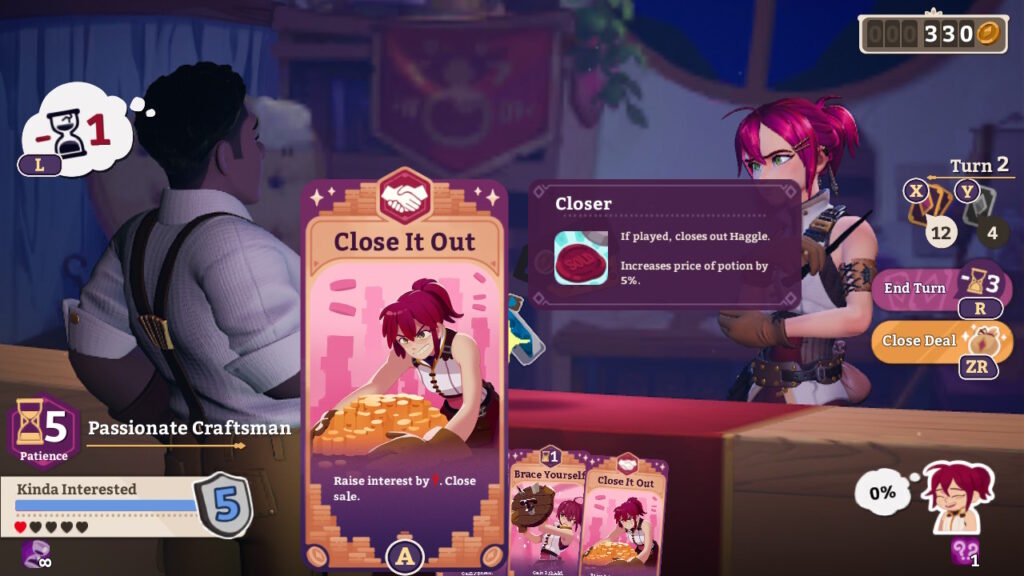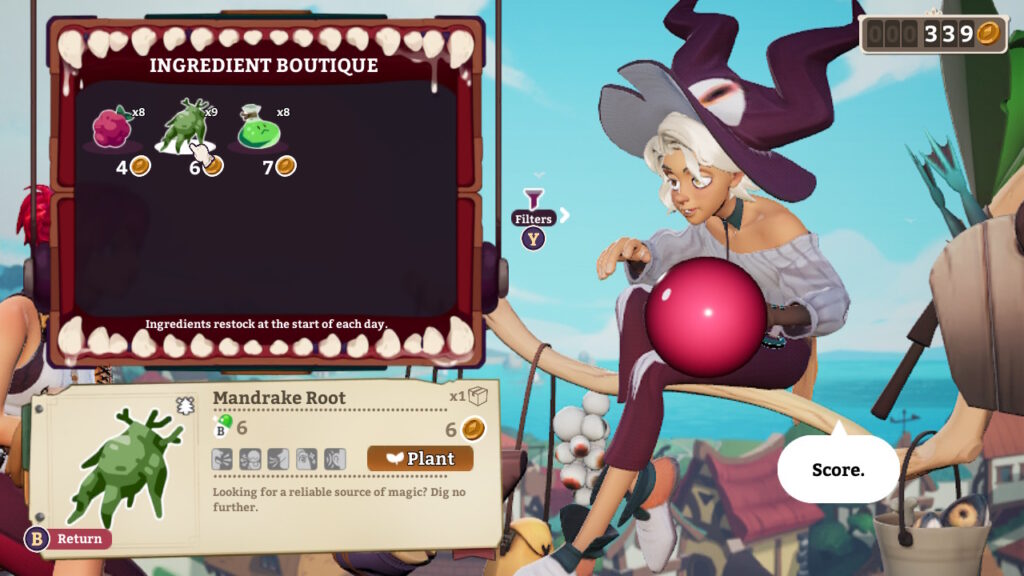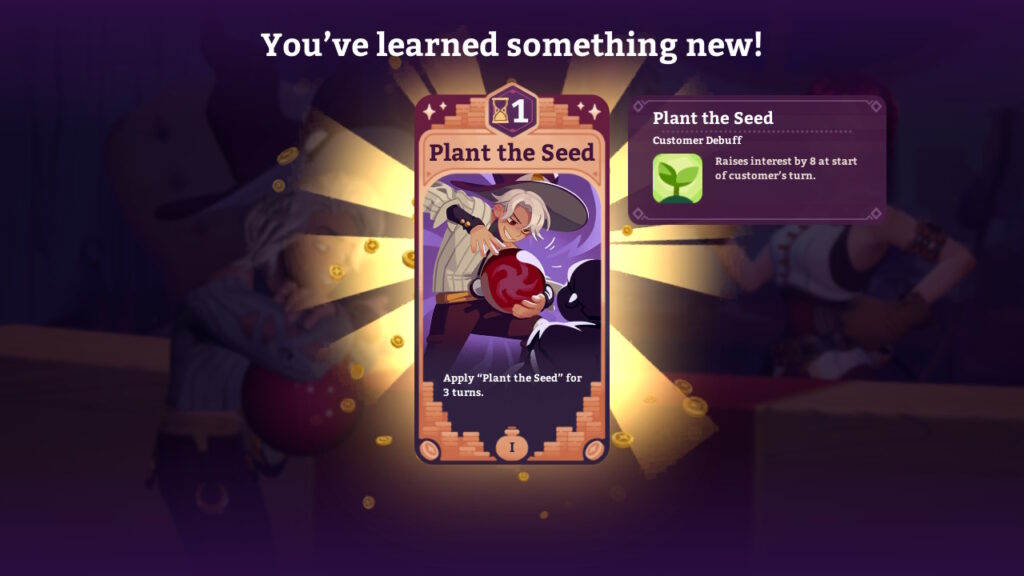
Developer: Voracious Games
Publisher: Marvelous
Platform: PC, Switch, PS5, Xbox Series X|S
Tested on: Switch
Potionomics: Masterwork Edition – Review
Two years after debuting on PC, Voracious Games’ Potionomics has reached its next milestone with the appropriately titled Masterwork Edition. For PC players, this step is more evolution than revolution, because the new features are included in a free update, with additional content available as a paid DLC. The real big deal with the Masterwork Edition is that the game is now available on consoles. We regretfully missed out on Potionomics’ initial release, so this release seemed like a perfect opportunity to rectify that. Was Potionomics: Masterwork Edition able to enchant us or were we left with economic depression?
Story
If you’ve played games like Stardew Valley or Harvest Moon, then Potionomic’s premise may sound familiar. Our protagonist, Sylvia, has inherited her uncle Oswald’s potion brewing business. When she arrives at the shop, it turns out that it’s an old, dusty derelict building. It’s up to our plucky heroine to turn it into a blossoming emporium of magical concoctions. Potionomics does put a slight twist on that familiar narrative formula. It turns out that dear old uncle Oswald got in some hot water with a loan shark, and his debt has been transferred to Sylvia. Sylvia’s new sidekick, a talking owl named Owl, informs her that the only way to pay everything off is to participate in potion-brewing contests. Potionomics’ story may not win any prizes for originality, but it more than makes up for this with how delightfully charming its cast is.
Graphics
Aesthetics are perhaps Potionomics’ strongest suit -and that’s saying a lot. The character designs look like they came straight out of a Pixar film. Potionomics blends different art styles depending on the context in which they are needed. You’ll see Sylvia fully rendered in 3D, as well as all sorts of illustrative styles. You’d expect this smorgasbord of styles to clash, but somehow Potionomics makes it work. That makes it all the more sourer that visual performance simply isn’t up to snuff on the Switch. While the essence of the aesthetics still shines through, things are dragged down by shoddy lighting, jaggy edges, and stuttering.
Sound
One of the selling points for the Masterwork Edition is the addition of voice acting, and we can see why. The cast does an absolutely stellar job of adding emotional depth to the excellent dialogue. Not everything in the game is voiced, but the important parts are. Accompanying the voice work is a cheerful atmospheric soundtrack that will get stuck in your head. Sound effects round things out nicely, although they aren’t anything special.
Gameplay
Part shop simulator, part deck-building game, and even part dating sim, Potionomics brews up a gameplay concoction that shouldn’t work as well together as it does. The core gameplay loop is deceptively simple. You gather ingredients, brew potions and sell them in your shop. Your profits are reinvested in better ingredients and shop upgrades, allowing you to make more money, which can then be spent on further advancements. After a set number of days, you participate in an alchemy contest, where you present your best potion possible. Winning those nets Sylvia a ton of cash, which is used to gradually pay off the outstanding debt. While all of this is going on, Sylvia also gets to know the town’s inhabitants and builds lasting friendships with them. There’s even room for a romantic subplot… or more than one if you decide to activate the polyamorous option when starting a new game.
As Sylvia, you decide how you fill your day, although every action you take consumes precious time. Your main courses of action are brewing up new potions and selling them. As you progress, Sylvia becomes more adept at both potion brewing and haggling, and the game’s difficulty curve isn’t too steep, so you’re given a lot of leeway to find your footing. If you want to focus on the social aspects, you certainly can, although that’s probably not the wisest course of action given that you want to turn a profit at the end of the day. Building relationships with other characters can net you things like new haggling cards or ingredients, so this is definitely an integral part but it’s also easy to get lost in flirting with someone and then realizing the day is over without having sold anything.
When it comes to actually brewing potions and selling them, things are kept as accessible as possible, while maintaining a decent level of challenge. Brewing potions doesn’t require memorizing a lot of complicated recipes or even a wide variety of ingredients. In essence, there are four color-coded magical properties, and the outcome of a potion is directly related to those properties. You could get similar results by using two completely different ingredients with the same properties, at least in terms of what kind of potion you get out of your cauldron. Your choice of ingredients does matter in determining the finesses like taste and texture, which ties into how much money you can ask for your brew, but ultimately, things are kept simple enough. It’s a matter of selecting the right properties in the right amounts and letting things brew. One thing to always keep in mind is the upcoming alchemy contest. You need to keep your best ingredients aside for this one, because losing the contest means game over… and restarting the period between your loss and the previous contest.
Once your potions are done, you need to display them nicely on your shelves and open up shop. Presentation matters, because the nicer your shop looks, the more you can charge for your goods. This is where the deck-building aspect comes in. Different kinds of customers will visit you and you’ll need to engage in a card-based haggling duel. Sylvia isn’t the best merchant and is vulnerable to anxiety and snide remarks from her clientele, but she does have a couple of tricks up her sleeves, in the form of different cards that represent her sales pitch. Play your cards right and the customer walks away with one of your bottles, leaving you with a healthy profit. As you unlock better cards, there is a sense of growth in Sylvia’s personality, and she becomes more confident and shrewd. The haggling portion of Potionomics was perhaps our favorite aspect of the game, although the button placement on our pro controller wasn’t always ideal. We did miss out on a few deals by accidental misclicks.
While we enjoyed our Potionomics experience on the Switch, things didn’t go as smoothly as we would have wanted. We already mentioned the visual shortcomings, but the game can also get a little laggy, especially when navigating different menus. Loading times are also longer than we would have liked. It’s far from unplayable, but we do suspect that Potionomics will run with less hassle on other platforms. Still, being able to take the game on the go is a huge plus, so a case can be made for picking it up on the hybrid handheld, especially since Potionomics is best enjoyed in bursts. Things can get repetitive after a couple of hours, but half an hour of shopkeeping during a lunch break? Count us in. You’re getting plenty of bang for your buck too, as the Masterwork Edition includes all previously released content of the PC version, including the newly released Boss Finn DLC. For €29.99, that’s a hell of a deal.
Conclusion
As a whole, Potionomics provides a fantastic take on shop simulation, with unlikely elements like deck-building providing a fresh twist. There are a handful of issues we had with the Switch version of the game in particular, like the visuals not reaching their full potential and a less-than-buttery smooth performance. Still, the gameplay is satisfying enough that we’re happy to overlook that in favor of portability. If you don’t care about carrying Sylvia around with you, then your experience on other platforms is likely going to be both prettier and slicker. Regardless of your preference, Potionomics comes highly recommended.










No Comments